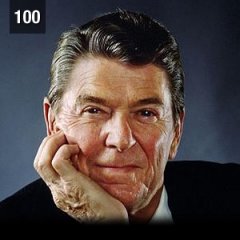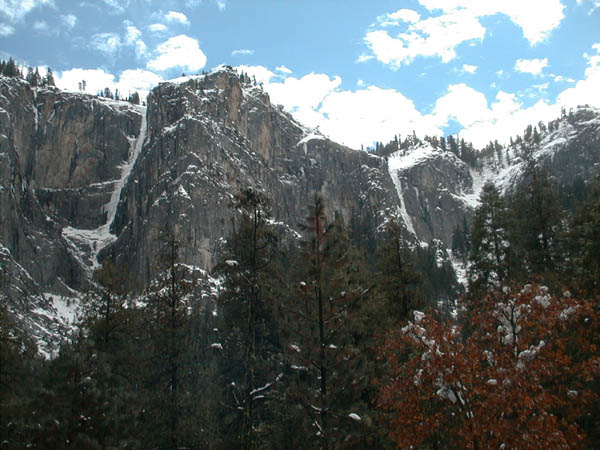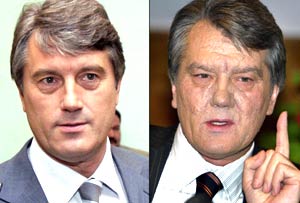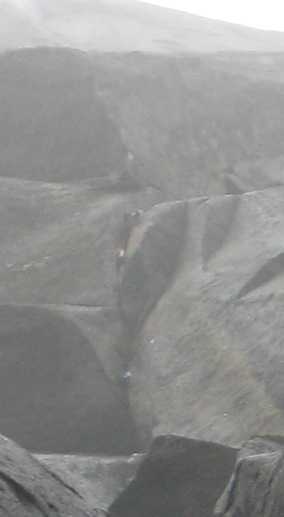-
Posts
7099 -
Joined
-
Last visited
Everything posted by Peter_Puget
-
Check out the demo! Note that the top climber in the second to last screen in the demo is a Marty Bland...is this our fellow cc.comer? [edit] Yes it is. Do the develpers post here too?
-

Reminder-Don't Call it "Infinite Bliss" anymore
Peter_Puget replied to B.S.'er's topic in Climber's Board
My God has logic left this planet?!?! Example #1: “The route was climbed on sight without pins or bolts and is 95% the same line as the "Infinite Bliss" rap bolt line (95% the same is pretty amazing as far as mountain routes go).” Now Preiss states that he did not climb 9 pitches of the IB route. The IB route is 23 pitches. Thus Weiss climbed about 61% if the IB at best – not 95%. Example #2” '[My line] shows that this face didn't need to be bolted into submission for the sport climbers to play their no-risk sport/game." Doesn’t it seem that for sport climbers to play their “no risk” game bolts are required by definition? -
I lived w/o a stereo for the better part of a decade. About 10 years ago I purchased a mid level stereo system and was so disappointed with the digital sound that when I moved I put it in storage and bought a shelf sized system. 20 and 24 bits DACs seem to improve the sound but I am wondering about SACD. Any thoughts? Is it another Laserdisc or will it be around? Does it sound as good as the hype?
-
While my wife was pregnant she wore a $20.00 costume ring instead of her wedding set. She would quite regularly get compliments on this $20 ring from strangers. After our first daughter was born she went back to the real thing and no more compliments. When our second daughter was gestating the $20 ring came back and so did the compliments.
-
get this new style belay seat
-
oops sorry wrong valley...that first pic is of THE Valley.
-
Cream Twilight Zone Those have been on my list since 1978.
-
-
You bring up prodigal spending by the government as a problem. Under the current system the incentive will always be to expand benefits to the point where the system is bound to collapse. (see medicare and the recent drug benefit as a related instance of this) Privatisation will, by making the system fully funded, be a real "lockbox" for Social Security by keeping Congress from raising benefits or spending any funds in the "Trust Fund." As for transition costs, check out the Chilean exmple (link above) and remember that from an economic point of view the US Gov borrowing money explicitly to finance cash flow changes brought about by a transition to privatisation would likely be of zero cost and perhaps a benefit as it is merely the trading of a real defined liability for an off balance sheet liability. You brought up Enron earler certainly then you should know about off balance sheet items!
-
Things to consider: 1 The trust fund is a myth. 2 Social Security reserves are restricted by law to interest-bearing obligations of the United States or obligations whose principal and interest are guaranteed by the U.S. government. 3 Social Security benefits are now tied to wage growth, and wages are rising faster than prices. The result: over the next 75 years benefits are expected to increase nearly 18x, while prices will go up 9x! 4 Social Security is a transfer scheme, not a pension plan. 5 A least two dozen countries have reformed their state-run retirement programs to include private accounts including Chile, Sweden, Australia, Peru, the U.K., Kazakhstan, China, Croatia and Poland.
-
No me gusto para nada darme cuenta lo irrespetuosos que nos hacen quedar la gente que silvaba a Fripp, ya que quedan mal con el, con Vai y Satch, con la gente...a mi tampoco me gusta lo que hace pero por una cuestion de respeto me callo...ademas duro 15 minutos nada mas como en el dia anterior... "
-
More reading....
-
Yet more PK: There is a case for reforming Social Security; there is even a case for privatization. But we can't have a meaningful debate about reform unless the parties to the debate are willing to discuss the issues honestly. President Clinton’s hand-picked Advisory Council on Social Security spent three years investigating reform options, and in 1997 recommended to Health and Human Services Secretary Donna E. Shalala two different plans involving private accounts — plans which received the endorsement of the majority of the council’s members. link
-
The always entertaining Forawker: “it's easier to label people than it is to come up with cogent arguments, supportive data, and an alternative plan. that's why there's so much screaming in politics. it plays to the lowest common denominator.” The never entertaining PK: "They come to bury Social Security, not to save it. They aren't sincerely concerned about the possibility that the system will someday fail; they're disturbed by the system's historic success. For Social Security is a government program that works, a demonstration that a modest amount of taxing and spending can make people's lives better and more secure. And that's why the right wants to destroy it." Here’s Mr Jim: Krugman is an economist and is at his best in this arena. He can stray sometimes into subjects that he shouldn't. On SS he is right on and consistent, he gave the Clinton admin grief on their lack of attention to SS. Here is PK again: "Where is the crisis? Just over the horizon, that's where... In 2010...the boomers will begin to retire. Every year thereafter, for the next quarter-century, several million 65-year-olds will leave the rolls of taxpayers and begin claiming their benefits. The budgetary effects of this demographic tidal wave are straightforward to compute, but so huge as almost to defy comprehension."
-
Rudy - Now in my mid forties I find that after reading a TR on cc.com I need a 3-4 day rest.
-
Mr Yanukovych’s supporters ridiculed the opposition, saying the illness was probably caused by bad sushi, too much cognac or a severe case of herpes.
-
-
No zoomin! I just d/l the picture and crop everything but the triple roofs.
-
-
I thought this was worth cut & pasting: The war in Congo involves 9 African nations and has plunged much of central Africa into chaos. Millions of people have been killed with no end to the conflict in sight. On the scale of human misery it is a far greater catastrophe than Kosovo at its historical worst or Iraq in the wildest fantasies of Noam Chomsky. A backgrounder to the situation is provided by Global Security : The war began on 02 August 1998, when Laurent Kabila tried to expel Rwandan military forces that had helped him overthrow Mobutu. ... and upon which the Congolese Tutsis and the governments of Burundi, Rwanda, Uganda and Burundi all relied for protection from hostile nongovernmental armed groups operating out of the eastern part of the country. These groups included: * the Interahamwe militia of ethnic Hutus, mostly from Rwanda, which fought the Tutsi-dominated Government of Rwanda; * Hutu members of the former Rwandan Armed Forces, believed to be responsible for the 1994 genocide of Tutsis in Rwanda, which also fought the Government of Rwanda; * the Mai Mai, a loose association of traditional Congolese local defense forces, which fought the influx of Rwandan immigrants; * the Alliance of Democratic Forces (ADF), made of up Ugandan expatriates and supported by the Government of Sudan, which fought the Government of Uganda; * several groups of Hutus from Burundi fighting the Tutsi-dominated Government of Burundi. In the ensuing civil war, elements of the armed forces of Burundi, Rwanda, and Uganda operated inside the country in support of the rebels; elements of the armed forces of Angola, Chad, Namibia, and Zimbabwe operated inside the country in support of the Government; and the nongovernmental armed groups mentioned above operated inside the country on the side of the Government, often as guerrillas inside RCD-occupied territory. Since then, five 'peace agreements' have been brokered without result by the UN and enforced by Blue Helmets -- which if the Economist is to be believed arrived in a clown car. In an article provocatively titled Is this the world's least effective UN peacekeeping force? they report: The UN peacekeeping force in Congo (MONUC), the world's largest, is supposed to be disarming these rebels, but has failed to neutralise them. Indeed, since MONUC was first deployed to Congo in 1999, it has consistently failed to keep anyone in the region safe. In two Congolese cities in 2002 and 2003, UN soldiers watched as hundreds of civilians were murdered outside their bases. In May this year, they sat back as an unsavoury rebel chief seized control of Bukavu, Congo's fourth city, despite the presence of a large and well-armed MONUC garrison on the outskirts of town. The blue helmets could easily have scattered the rebels, but the only shots they fired in anger that week were at civilians demonstrating against their inaction. Three of the protesters died. ... Indeed, it would be hard to exaggerate the UN's unpopularity. Some Congolese shake their fists or throw clumps of mud at passing UN patrols. Three months ago, militiamen burned 17 people to death while a detachment of MONUC troops 200 metres away, whose mandate authorised them to use force to prevent such massacres, did nothing. “Is MONUC here to do anything apart from count the bodies?” asked a Congolese witness. MONUC's reputation has been damaged still further by revelations that some peacekeepers have been sexually molesting Congolese children. In the latest incident, a senior French civilian with the mission has been handed over to authorities in Paris and the UN has launched an investigation which insiders say will seek to discover whether MONUC has been penetrated by organised paedophiles who recruit their friends. Last month, a mob in the eastern town of Goma, apparently under the misapprehension that your correspondent was connected to MONUC, smashed the windows of his car and tried to strangle him. He escaped only by pulling a wad of dollars out of his sock and throwing it in the air, and then driving off in the ensuing maul. Some of these charges are grudgingly accepted by UN headquarters who argue that although the Blue Helmets are useless they are really quite useful. What is necessary is to make them larger so that even while they remain useless they may also grow more useful. MONUC's chiefs have argued that they do not have enough troops for the job. They have a point. Though the UN Security Council has ordered the force to be expanded from about 10,000 to 16,000, military experts guess it needs about 50,000. It won't get that. Why, then, is the UN in Congo at all? MONUC argues that, though small, the mission serves as a deterrent. But whom does it deter? The ragtag militias that effectively control the north-eastern region of Ituri delight in taking potshots at peacekeeping units. Deterrence, argues Jim Terrie of the International Crisis Group, a lobbying organisation, depends in part on potential enemies' belief “that you will actually do something. [but] there is very little belief that MONUC will do anything.” MONUC has already indicated that it probably will not stop a Rwandan invasion. This may be because Rwanda has signalled that it will make only a brief foray into Congo to kill the rebels who threaten it, and then leave. But if so, that would hardly satisfy the people of eastern Congo. ... The International Crisis Group (ICG) , a nongovernment organization which lobbies governments to adopt policies which it believes will lead to world peace makes a more sophisticated version of this argument. They argue that if UN Peacekeepers were given more power, training and military capability they would cease to be inutile and take the crisis in hand. No peace can be expected in the Congo unless "the Security Council takes seriously the important recommendations Secretary General Kofi Annan has made for improving MONUC ... MONUC should be at least doubled from its present 10,800". Other recommendations by the International Crisis Group include: 1 a stronger mandate that includes the authorization to respond robustly to any attack or threat of attack, including, if necessary, in a pre-emptive manner; 2 improved command and control of military operations and better integration of military and civilian objectives; 3 enhanced access to and/or embedded technical capabilities for intelligence and surveillance; and 4 increased levels of better-trained and prepared troops. If these proposals sound like the recent recommendations to 'reform' the UN writ small, it is no coincidence. The high level panel constituted by Kofi Annan to propose recommendations to rescue the World Body from the twin threats of irrelevance and its inability to restrain the United States included Gareth Evans, who is President and Chief Executive of the Brussels-based International Crisis Group (ICG). Evans delivered an address called Shifting Security Parameters in the 21st Century (link) which contains nearly all of the elements now being proposed to reform the UN. In this model the currrent threats to world peace are: a international terrorist organizations b WMD proliferation c failed states d an out-of-control United States But to address the first three, the first step is to solve problem number four. The more worrying phenomenon is the outright rage and hatred which U.S. dominance is also generating, particularly concentrated in many parts of the Arab and Islamic world. ... The U.S. can’t do anything to alter its size, or much to moderate its relative clout, or anything to redress the disappearance of the Soviet Union as a power balancer. ... But what one can ask of the U.S., like anyone else, is that it think carefully about what its national interests actually are in this highly interdependent, globalised world we all now occupy, and recognise that it is no longer sufficient to define them in terms of security and economic benefits, both narrowly conceived. No country, however big or powerful, can solve by itself all the problems that affect it, whether the issue is terrorist violence, weapons proliferation, narcotics or other organized crime, refugee flows, health pandemics or environmental spillovers: the cooperation of others is essential, and that cooperation will only in turn be won if there is a willingness to help others solve their problems. In short, all of us, including the U.S. should think of national interest not just in terms of traditional security and economic interests, but as embracing a third element: the national interest in being, and being seen to be, a good international citizen. The key to arriving at the state where alles in ordnung is to get the rogue United States to understand the necessity of rules and to accept who makes the rules. The Problem of Rules -- There has undoubtedly been a a growth of cynicism and scepticism about the existence and bindingness of the international rules governing the use of force. Under the guise of acting to meet threats of one kind or another, states – and the U.S. in particular – have been seen as making up rules as they go along, going to war when they should not be, and not going to war when they should. ... The most urgent need in the international security debate, from whatever point in the ideological spectrum one approaches it, is to try to re-establish consensus about what the basic rules, or principles, governing the use of force should be, and how they should be applied in practice. I suggest that in all cases there is a basic over-arching checklist of six principles, or criteria, that must be worked through in determining whether it’s right to fight - applicable whether the threat is external or internal; or whether the threat is constituted by armies marching, by WMD acquisition, by terrorism, or by tribal machetes. And since no single country "however big or powerful" can set forth these rules that unlooked-for-task must fall to the tired shoulders of the United Nations. That is why the ICG believes that MONUC should have the right to use pre-emptive force while America is read the Riot Act. The ICG admits that the rickety World Atlas is, in its present state, unlikely to lift a soup spoon, but like MONUC in the Congo, there is nothing that a few steroids paid for by its richer members won't cure. Evans goes straight to core recommendation that was eventually adopted by the reform panel: increasing the size and power of the Security Council. United Nations. Secretary General Kofi Annan last year is just one of the many who have argued that UN institutional architecture is badly out of date and desperately needs reform – designed as it was for its original membership of 51 states, not its current 191, and reflecting in the composition and powers of the Security Council the power balances of 1945, not the world of 2003. The decisions of the Security Council, he said, ‘increasingly…lack legitimacy in the eyes of the developing world, which feels that its views and interests are insufficiently represented among the decision-takers.’ And he has now appointed a High Level Panel – on which I have the pleasure of sitting along with, among others, Amre Moussa - to come up with answers on this and related issues. But Evans and the International Crisis Group are wrong. The key problem facing the United Nations is lack of accountability not to its constituent institutions, though it lacks that, but to the individual inhabitants of the world. Its inefficiency, corruption and fantasy policies are the result and not the cause of its problems. Nowhere is that failure more evident on a macro scale than in Kofi Annan himself and his management of the Oil-For-Food Programme. That difference shows up at all levels, even in the micro scale. David Ignatius (Washington Post link) , writing from Kuwait, describes how men fighting for their lives, given the freedom, can find the means to do it. When a nationwide insurgency (in Iraq) exploded in April, the roads turned deadly. The reservists quickly became combat veterans, and the frightened civilian drivers were replaced by civilian recruits who understood the dangers. Capt. George Petropoulos, an ex-cop from Milwaukee, arrived around the time of the April insurgency. He immediately started doodling with designs for improvised armor for the Army's 16-wheelers. He showed how the armor could be fabricated from locally bought steel, at a cost of about $1,600 a truck. Army mechanics bolted steel plates on trucks as fast as they could, and now many of them have what Petropoulos calls his "feel-good armor." The Army bungled initially by sending only 900 armored Humvees to Iraq, but here, too, there was a process of adaptation. Thousands of improvised armor kits were rushed to the war zone, and the Army is working round-the-clock to harden the vehicles. U.S. officials say there are now about 15,000 armored Humvees in Iraq, with more on the way every day. This can be contrasted to the problem-solving skills of MONUC as described by the Economist. Morale among the blue helmets is not high. Many regard their posting to Congo as the height of misfortune. Some are ashamed to be part of such an indolent force. During massacres in Ituri's main town of Bunia last year, some Uruguayan peacekeepers suffered nervous breakdowns after watching atrocities they had been ordered not to prevent. One reportedly told his psychiatrist that goats were talking to him. When asked what they were saying, he replied, “They're shouting: ‘Help me! Help me!'” That's basically the message of UN reform proposals: "Help me! Help me!" [EDIT:The UNistas see power not in their hands as a threat to the goal of unaccountable bureacratic leadership.]
-
Instant Excitement! I’ve been working way too much and now the possibility of snow this weekend has made me completely depressed. So I needed a little eye candy. Great climb! Great picture!
-
Klenke - Ill post the attachment later It's on my home 'pute. It has nother to do with the Tango lifestyle.
-
Tango dancing rocks! I can hardly wait until tonight! Plus here is a cool attachment for Klenke
-
The “Axis of Evil” Iraq – down for the count But the question was often raised: Why not attack NK or Iran well here is the answer to NK: link What is the disposition of the Chinese forces on the border? How many are there? Could the Chinese have them positioned there for humanitarian relief efforts should the regime collapse? There is no reason why humanitarian missions must be US or NATO-led. Such a move by the PRC would give it quite a bit of prestige. I can hear the singing now-----“Oh, Oh Domino….”





